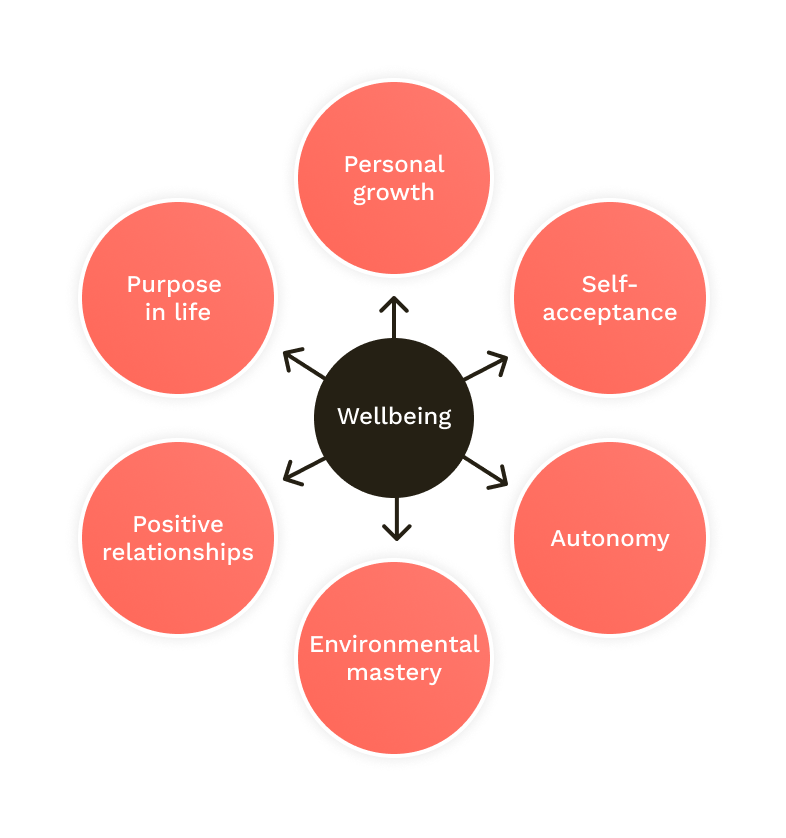6th November 2023
What is purpose and why is it relevant to health?
A sense of purpose emerges as a key feature in Carol Ryff’s theory of psychological wellbeing. Ryff developed CORE DIMENSIONS of psychological wellbeing based on recognised theoretical foundations. At On Wellbeing we see these as ‘plates’ that we need to keep spinning in order to function optimally, or at least with a reasonable level of wellbeing. Purpose is a key factor in this.
A sense of purpose can be seen as the hanger which everything else falls from. A sense of purpose is like your own vision statement. All successful organisations will create a vision statement. Otherwise, how would they know what it is they are striving for? Yet as individuals we never think this is a priority.
How can we invest in ourselves, if we do not have clarity around where we are going?
Having purpose equates to giving something meaning, giving your life meaning.
We are all looking for meaning
Victor Frankl’s famous book ‘Man’s Search for Meaning’ provides insight into human freedom and purpose following his harrowing experiences within concentration camps. Some of his most famous quotes reflect on the importance of purpose and meaning.
Those who have a ‘why’ to live, can bear with almost any ‘how’”…
“Life is never made unbearable by circumstances, but only by lack of meaning and purpose.”
How do you know if you have purpose? What does purpose look like?
Ryff identifies purpose as having goals in life and a sense of directedness, feeling like there is meaning to present and past life, holding beliefs that give life purpose, holding aims and objectives for living

Your ‘purpose’ might look very difficult to someone else. Many of us align our purpose to our careers but if you are trying to define your purpose it is helpful to look beyond a job title. What change, if any, do you want to make in the world? How can you contribute at a personal, interpersonal, local or national level? Paul Gilbert (psychologist ‘The Compassionate Mind’) talks a lot about this, as does Johan Haari (author ‘Lost Connections’) that meaning has a significant foundation in our connections with others.
Without a purpose in life you may feel as though you lack a sense of meaning in life; perhaps have few goals or aims and lack a sense of direction. You may not see purpose in past life with few outlooks or beliefs that give life meaning.
For many of us…we may lie somewhere in between these two ends of the spectrum. It is useful however, to consider how we can create a stronger sense of purpose and create more depth around the meaning we give to life.
The global pandemic has impacted our sense of purpose by generating uncertainty and a loss of control. Many of us may feel this in our daily lives and wonder why it still seems to be affecting us.
What can you do if you feel 'stuck' and are not sure what your 'purpose' is…or should be?
To create a ‘mission statement’ for yourself is a good starting point. This also serves to support and filter decisions and choices that you make. How can the thing you are trying to decide on contribute to your own personal purpose?
Starting points to find or strengthen purpose:
Be compassionate. Change and movement does not come from a place of disappointment and frustration. Avoid self criticism.
Be curious. Behaviour change comes when we look at ourselves with curiosity. Try to analyse the situation and wonder why we are doing what we are doing, rather than berating ourselves for it.
Reject the narrative that we are being sold in relation to what our purpose should be based on. Many psychologists have demonstrated the negative correlation between money and psychological wellbeing. The idea that ‘things’ and ‘external praise’ will support your purpose is hugely flawed. Instead try to consider alternative sources of comfort and happiness.
If you are stuck in a job and can’t leave it due to financial commitments but at the same time feel unhappy, lacking purpose and stuck then try to take on new experiences as frequently as possible, using a notebook to journal how you feel after each one.
If you are stuck in a relationship and feel uncertain then think about the ‘things’ you need to make you happy and then try to pursue these irrespective of the relationship and see where the relationship lies….
Viktor Frankl said that there are three main avenues to which one arrives at meaning in life – (logotherapy)
Creating work or doing a deed
Experience or meeting someone (love)
Belief that you can change, rise up and grow…that meaning can emerge from suffering rather than presenting yourself as a victim (and so embrace the difficult times)
”if you cannot change a situation you can still choose an attitude”
Purpose can and should change as your life evolves….YOU ARE the CEO of yourself!
Reference:
• Man’s search for meaning (originally written in 1946) Viktor Frankl (2004)
• The Compassionate Mind by Paul Gilbert (2014)
• Lost Connections – Uncovering the real causes of depression by Johann Hari (2018)
• Ryff, C (2014) Psychological wellbeing revisited: Advances in the Science and Practice of Eudamonia. Psychotherapy and Psychosomatics.





